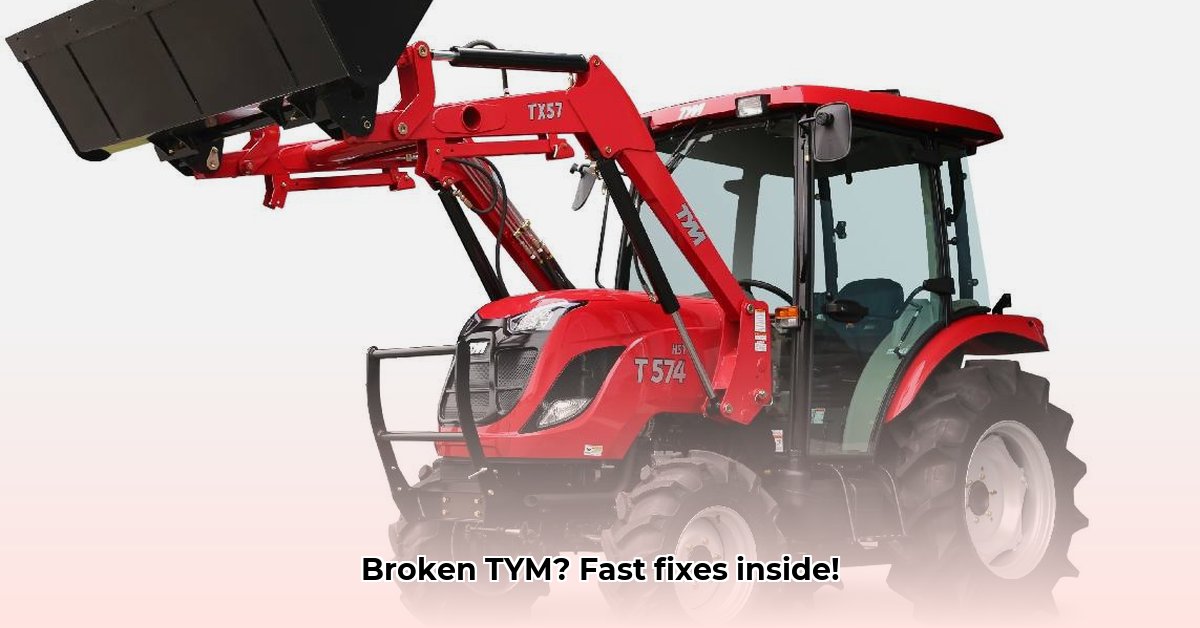
Common TYM Tractor Problems: Troubleshooting and Solutions
TYM tractors, while offering robust performance for their price point, aren't immune to common issues. This guide provides practical solutions for frequently encountered problems, empowering you to keep your TYM running smoothly. Understanding these issues, and implementing preventative maintenance, is key to maximizing your tractor's lifespan and minimizing downtime. Do you often find yourself frustrated with unexpected repairs? Let's get your TYM back in top condition. For more troubleshooting tips, see this helpful guide on tractor starting issues.
Transmission Troubles: Shifting Gears Smoothly
Unusual noises during operation, particularly at low engine speeds, often indicate transmission problems. Grinding, whining, or squealing are clear signs that something isn't right – a problem often stemming from worn gears or low transmission fluid.
Check the Transmission Fluid: Locate the transmission dipstick (consult your owner's manual), and check the fluid level. If low, add the correct type of fluid specified in your manual. Low fluid is easily remedied.
Listen Carefully: Pay close attention to any unusual sounds. Persistent noises despite adding fluid indicate more serious damage requiring professional attention. Ignoring these issues can lead to costly repairs.
Professional Assessment: Persistent grinding, whining, or squealing necessitate a visit to a qualified mechanic. This ensures a proper diagnosis and prevents escalating damage. Early detection often saves significant expenses.
Fuel System Frustrations: Optimizing Fuel Efficiency
Poor fuel economy or strange engine smells often point to low-quality fuel or a clogged fuel filter. Remember, the cost of cheap fuel can be far outweighed by costly engine repairs.
Fuel Quality: Always use high-quality diesel fuel, as using cheaper fuel can lead to long-term engine damage. Consistent high-quality fuel is a cost-effective preventative measure.
Fuel Filter Replacement: Regularly replace your fuel filter (check your owner's manual for recommended intervals). A clean filter prevents contamination and ensures optimal engine performance. A clogged filter is a significant factor in poor performance.
Engine Diagnostics: If your engine sputters, runs rough, or loses power, a fuel filter might not be the only issue. Professional diagnosis is recommended to prevent further damage. Ignoring symptoms can compound problems.
Electrical Anomalies: Troubleshooting Lights, Battery, and More
Dead batteries and malfunctioning lights are common annoyances, but usually easy fixes. Start by inspecting the battery and wiring connections.
Connection Inspection: Check battery terminals for corrosion, which reduces electrical flow. Clean terminals using a wire brush and terminal cleaner. Clean connections are essential for proper electrical operation.
Battery Testing: If a weak battery is suspected, test it with a multimeter or have a mechanic assess it. A dead battery will need replacement. A reliable battery is crucial for proper functioning.
Electrical Component Troubleshooting: For malfunctioning lights, check fuses first. Problems with wiring necessitate professional help. Working with electrical systems requires expertise.
Steering System Concerns: Maintaining Control
Difficulty steering or unusual noises from the steering mechanism demand immediate attention. Never compromise safety.
Steering System Inspection: Carefully examine the steering system for damage, wear, loose connections, or leaks. A thorough inspection can identify potential issues.
Hydraulic Fluid Check (if applicable): For hydraulic steering systems, check fluid level and condition. Low or contaminated fluid can impair steering. Regular fluid checks are a critical maintenance task.
Professional Repair: Steering problems are serious safety hazards. Seek professional help immediately if issues persist. Don't take chances with your safety or your equipment's integrity.
Preventative Maintenance: A Proactive Approach
Regular maintenance prevents costly repairs. This simple schedule will significantly extend your tractor's lifespan and avoid many common problems.
| Task | Frequency | Impact |
|---|---|---|
| Oil Change | Every 50 hours | Prevents engine wear and ensures lubrication. |
| Fuel Filter Replacement | Every 100-200 hours | Improves engine performance and prevents contamination. |
| Air Filter Cleaning/Change | As needed | Ensures clean air intake for optimal engine performance. |
| Tire Pressure Check | Before each use | Affects fuel efficiency, handling, and tire life. |
| Battery Inspection | Monthly | Prevents corrosion and ensures reliable starting. |
When to Call a Professional
While many minor issues are DIY-fixable, significant transmission problems, persistent engine troubles, or steering concerns require professional attention. Early intervention often saves money and prevents further damage. Professional advice protects your investment and your safety.
Key Takeaways: Maintaining Your TYM Tractor
- Regular maintenance is paramount: Preventative maintenance is the most cost-effective way to extend the life of your tractor.
- High-quality fluids and fuels are essential: Using the correct fluids and fuels prevents premature wear and tear.
- Address problems promptly: Early attention to minor issues avoids costly major repairs.
- Professional service is invaluable: Regular professional inspections and timely servicing are critical for longevity.